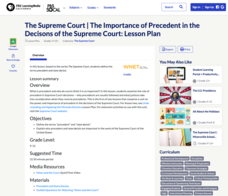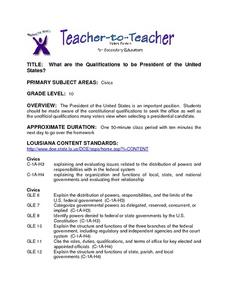Constitutional Rights Foundation
Arizona v. United States — States and Immigration Law
As part of a study of immigration law, class members read a summary of the Supreme Court case, Arizona v. United States. They then examine a series of examples and acting as federal court judges, must determine if the scenarios meet the...
Street Law
The Challenge of Selecting an Ideal Supreme Court Nominee
Nearly every president has had the opportunity to name a nominee to the United States Supreme Court. But what makes someone an ideal candidate to become a Supreme Court justice? High schoolers test their prior knowledge about the Supreme...
Curated OER
The Supreme Court: The Judicial Power of the United States
Students investigate some basic facts about the Supreme Court by examining the United States Constitution and one of the landmark cases decided by that court. The operation of the Supreme Court forms the focus of the lesson.
Curated OER
The Supreme Court: The Judicial Power of the United States
Middle schoolers learn basic facts about the Supreme Court by examining the United States Constitution and one of the landmark cases decided by that court.
Constitutional Rights Foundation
Plyler v. Doe: Can States Deny Public Benefits to Illegal Immigrants?
Illegal immigration is an ever-changing source of consistent controversy. A reading passage about the rights of undocumented workers and illegal immigrants—and the lack thereof—guides high schoolers into a mock trial activity. Three...
Advocates for Human Rights
Mock Immigration Court
As part of a unit study of immigration, class members participate in a mock Immigration Court activity in which they argue four cases before an immigration judge.
Judicial Learning Center
Levels of the Federal Courts
The Supreme Court gets all the glory, but very few federal cases make it to the highest court. An interesting lesson explores the structure of the lower levels of the federal court system. In addition to outlining the organization of...
Curated OER
Civil Liberties and War Powers: Korematsu v. United States
Eleventh graders compare and contrast Supreme Court decisions dealing with the application of civil rights during times of war, with emphasis on discrimination and detention. Working in groups, 11th graders review cases and analyze how...
Curated OER
United States v. Nixon (1974)
Young scholars examine checks and balances. In this Supreme Court lesson, students examine primary documents from United States v. Nixon and discuss the implications of the decision.
C-SPAN
Supreme Court Justices Research and Resumes
According to Article III, Section1 of the United States constitution, the only qualification one needs to be appointed to the Supreme Court is to demonstrate "good behavior." The president and Congress are given the power to determine...
Curated OER
How was the Constitution Used to Organize the New Government?
How did the United States Congress determine how the new president and vice president would be named when the nation was first established? Who would provide money for the government, and how would the executive branch be organized?
iCivics
Mini Lesson: Supreme Court Opinions
The court of last resort. Historians research, using current cases and issues, the impact the Supreme Court of the United States has on how our nation operates. They analyze recent decisions made by the nine judges and determine how the...
Curated OER
Everyone Wants to Be President
How can you help your class understand the breadth of duties and the challenges of being the leader of the United States?
Heritage Foundation
Courts and Judges
If the Supreme Court is so supreme, why do all cases not just start there? High schoolers learn why every case does not start at the Supreme Court as well as the importance of hierarchy in the US judicial system in the 11th installment...
Constitutional Rights Foundation
How the First State Constitutions Helped Build the U.S. Constitution
Did you know that the United States Constitution was adopted after many state constitutions were already in place? Young scholars examine facts about the influence of states through an informative and interesting resource. Groups then...
Curated OER
United States Government 5th Grade
For this review of United States government worksheet, 5th graders recall facts and answer multiple choice questions. Students answer 25 questions.
Judicial Learning Center
The U.S. Supreme Court
How do Supreme Court justices determine which cases to consider? What happens when the Supreme Court decides not to take a case? The lesson explores important questions and others in the field of criminology. It focuses on the appeals...
Curated OER
Landmark Supreme Court Cases And The Constitution
Have an engaging class discussion on the Bill of Rights, U.S. Constitution, and the Supreme Court. Learners examine multiple aspects of the Marbury v. Madison case and the impact that case had on the judicial system in the U.S. Web...
Curated OER
Korematsu v. United States (1944)
Students examine equal protection. In this Supreme Court lesson, students examine primary documents from Korematsu v. United States and discuss the implications of the decision with regards to Japanese internment.
iCivics
The “Supreme” in Supreme Court
Does a public school have the right to restrict what t-shirts learners wear? Discover what happened when this question was brought to the Supreme Court, and review other major cases in United States history involving judicial review....
Curated OER
Lesson 4: The Judiciary: A Brief Introduction to the Courts System
Focusing on the judicial branch of government, the fourth lesson in this series explores the structure of the US courts system. Beginning with an engaging activity based on the short story The Lady or the Tiger, students go on to examine...
PBS
The Supreme Court: The Importance of Precedent in the Decisions of the Supreme Court
People often hear the words precedent and Supreme Court together, but why? A resource on the Supreme Court includes a variety of discussion questions, handouts that guide young historians, a video about Nixon and the court system, and...
Curated OER
Citizenship Worksheet 5 - Local and State Government
The Tenth Amendment of the United States Constitution delegates rights that have not been defined by the federal government to the states. But what are the responsibilities of state governments? What about county and city governments?...
Curated OER
What are the Qualifications to be President of the United States?
Students research the qualifications necessary to be the president of the United States. They create a want-ad for this position using what they have learned about the qualifications.

























